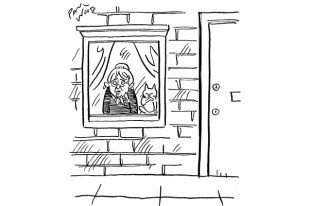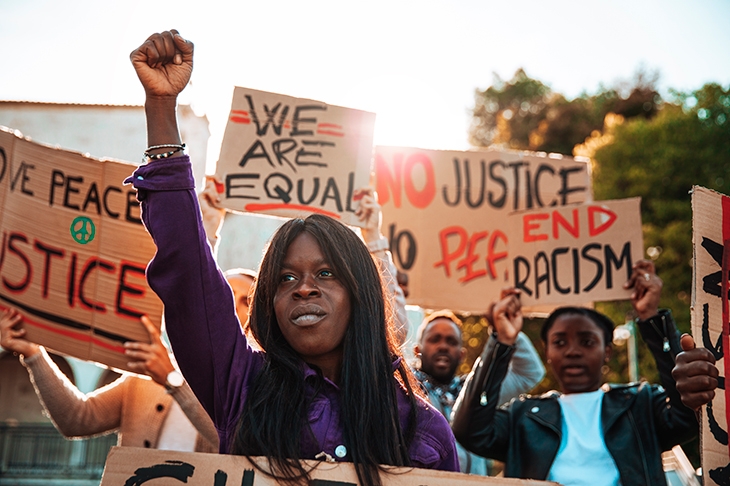After the death of George Floyd last year, and the subsequent Black Lives Matter protests around the world, racism is one of the hot-button issues of our time. And, according to Kehinde Andrews’s new book, The New Age of Empire: How Racism and Colonialism Still Rule the World, it is embedded deeply in the West:
A central thesis of this book is that White supremacy, and therefore anti-Blackness, is the fundamental basis of the political and economic system and therefore infects all interactions, institutions and ideas.
Andrews maintains this uncompromising tone throughout.
The book is partly a historical account of the transatlantic slave trade and European colonialism; it is also an examination of how contemporary institutions such as the IMF and the World Bank have damaged the finances of African and Global South countries. The West is rich because the rest is poor. Before Columbus and the age of empire, Andrews argues, Europe was ‘in a dark age, dominated by religious dogma and feudal suppression’. Subsequent to this, it stole resources from the cultures it conquered in the New World. The Enlightenment was not genuinely animated by the principle of human equality. It was white identity politics; it provided intellectual justification for enslaving Africans and committing genocide against indigenous Americans. Now we are in a new age of empire: modern-day trade agreements between the West and the nations of the Global South are merely extensions of an older ‘colonial logic’.

Strikingly, Andrews is critical of China’s role in Africa. Moreover, he doesn’t think the West invented racism; he attributes that to the 14th-century North African philosopher Ibn Khaldun. Nevertheless, it is the West that truly catches his ire.
For all his condemnation of the Enlightenment, however, Andrews is clearly committed to one of its core values: moral universalism. In one passage he writes:
The fact that $4 a day is labelled ‘working middle-class’ should be proof of the obscenity of this paradigm. Conditions that we would never accept in the West are marked as progress in the rest.
Andrews’s polemical fury might sustain his case in a TV debate, but he’s completely exposed in a book
He believes the standards we adhere to in the West should apply on a global scale.
However, on the inequalities between the West and the Global South, he also writes: ‘The architecture of a society that creates these injustices is the Enlightenment and its universalist philosophy.’ But what is universalism if not judging conditions in Africa by the same standards of the West?
The reason for Andrews’s recalcitrant attitude is that he wants revolution rather than reform. ‘Revolution is not only possible but it is absolutely essential if we truly want freedom.’ And his revolution consists of the Pan-African dream: uniting ‘Africa and the African diaspora’ to ‘create a true revolution, which remains the only solution to the problem of racism’. However, the moral framework with which Andrews denounces the West is not only shaped by western standards; Pan-Africanism is itself western. The concept of a universal black identity that transcends the cultural differences between black communities was invented by westernised blacks as a response to European oppression.
The first Pan-African conference was held in London in 1900; it was organised not by an African but a Trinidadian named Henry Sylvester Williams. The Pan-African Congresses were held in Paris, London, New York and Manchester before they finally reached an African city, Dar es Salaam, in 1974. Marcus Garvey never visited Africa in his life.
Can one espouse anti-racist radicalism while still recognising a western influence? Frantz Fanon, the Martiniquan theorist and revolutionary, affirms in the conclusion of Wretched of the Earth: ‘All the elements of a solution to the great problems of humanity have, at different times, existed in European thought.’
Andrews is certainly right to point out the historical atrocities carried out by western nations, practices justified by people who otherwise preached tolerance. His criticisms of the loans provided by the IMF and World Bank to African countries also needs to be taken into account for those of us who want a fairer world. But when he says the West cannot be the solution to the problem of racism, and then bemoans westerners for failing to apply universal standards, he disqualifies himself as a serious thinker. Either the West is rotten to the core and can do nothing; or it is shameful for failing to live up to its moral standards. Andrews, brazenly, argues both. His polemical fury could perhaps sustain his case in a morning-time TV debate, but he is completely exposed in a book.
White readers, what can you do? Andrews ponders this near the end, and here is his answer:
The quest for allyship is in itself misguided. The problem is that society is built on a White supremacy that permeates every institution, intellectual framework and interaction within it. If you have come this far and believe that White people offering a meaningful hand of friendship is the solution then you have missed the point.
Well, there you go. There is nothing you can do. Except, perhaps, tell all your white friends to buy his book.






Comments